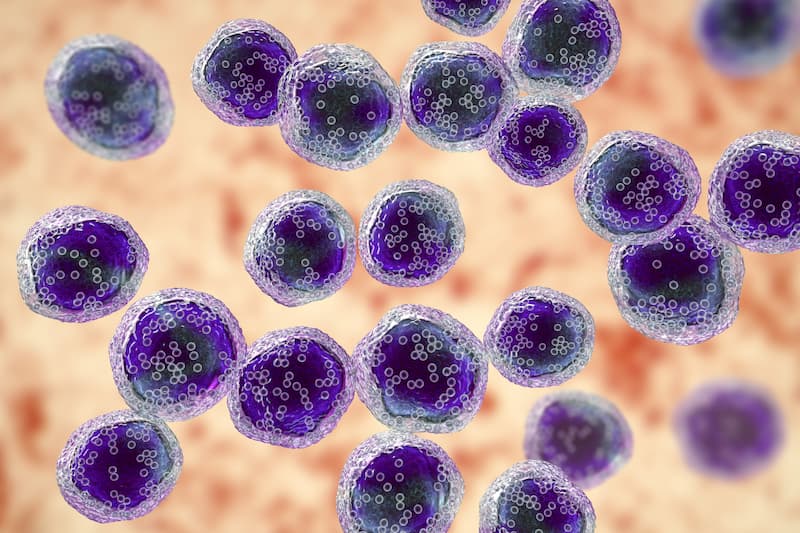Transposon-Engineered BAFF CAR-T Cells May Elicit Responses in Lymphoma
Three patients treated at the first dose level of BAFF CAR-T cells experienced minimal adverse effects in a phase 1 study.
Three patients treated at the first dose level of BAFF CAR-T cells experienced minimal adverse effects in a phase 1 study.

Transposon-based BAFF CAR-T cells (LMY-920) were well tolerated and demonstrated the potential to produce clinical responses among a small cohort of patients with B-cell non-Hodgkin lymphoma, according to findings from a phase 1 study (NCT05312801) presented at the 2024 Society for Immunotherapy of Cancer Annual Meeting.
Data from the trial reveal that a single grade 1 cytokine release syndrome (CRS) event was reported among the 3 patients, with no immune effector-cell associated neurotoxicity syndrome (ICANS) incidence reported. Additionally, a complete response was observed in one patient with transformed follicular lymphoma. A mixed response, characterized by a decrease in FDG uptake and a decrease in size of all lesions, and stable disease were recorded among 2 other patients with mantle cell lymphoma (MCL). Furthermore, one grade 2 incident of COVID-19 infection was observed in a 55-year-old patient with MCL.
“In terms of safety, it was quite good. [There were] low rates of low-grade CRS among 3 patients, no ICANS was observed, the standard hematologic toxicity [one would] expect from the lymphodepleting regimen [was observed], and [there was] little other relevant toxicity,” Matthew Spear, MD, chief medical officer at Denovo Biopharma, said in a presentation of the study findings. “The efficacy was quite remarkable. [The first] patient [had] diffuse large B-cell lymphoma [and achieved] a complete response with resolution of all FDG avidity on PET scan.”
Investigators of the phase 1 study enrolled 3 patients with histologically confirmed B-cell non-Hodgkin lymphoma who had relapsed after 2 or more lines of therapy, were refractory to prior chemotherapy, or had progressive disease at 12 or fewer months following autologous stem cell transplantation (ASCT). All patients were assigned to receive 1 x 106 BAFF CAR T-cells/kg in a 3+3 dose escalation. Prior to treatment, patients underwent lymphodepletion with fludarabine at 30 mg/m2 and cyclophosphamide at 500 mg/m2 once daily for 3 days.
Among the patients enrolled, ages varied from 55 to 81 years, and they received 2 to 4 prior lines of therapy. The 2 patients with MCL had P53 mutations, one of whom had prior Bruton tyrosine kinase inhibitor therapy and ASCT.
The primary end point of the study was assessing the recommended phase 2 dose of LMY-920. Key secondary end points included toxicity, disease response, duration of response, progression-free survival, overall survival, and incidence of anti-LMY-920 antibodies.
“Overall, [this study is] somewhat interesting in that this is the first of its kind CAR T-cell therapy testing patients using a BAFF-ligand to target non-Hodgkin lymphoma. It is also a transposon engineer target system, which are still relatively uncommon in the CAR T-cell field,” Spear said in the presentation. “Safety and efficacy at this point are looking good. This could be extrapolated farther, and that is perhaps the most interesting aspect of the system.”
Key inclusion criteria of the study included having more than 2 weeks since prior radiation or systemic therapy at time of leukapheresis; an absence of central nervous system lymphoma; and adequate pulmonary, cardiac, liver and renal function.
Key exclusion criteria included having a history of allogenic hematopoietic stem cell transplantation, uncontrolled incurrent illness, and other active malignancies, active hepatitis B or C infection, and a history of autoimmune disease with requirement of immunosuppressive medication within 6 months of treatment initiation.
Clinical trials evaluating LMY-920 in B-cell related multiple myeloma and systemic lupus erythematosus are ongoing. Additionally, an allogenic version of the BAFF CAR-T cell inhibitor is being developed.
Reference
Caimi P, Spear MA, Liter J, Largaespada D, Webber BR, Moriarity BS. Phase 1 study of novel transposon-based BAFF CAR-T cells (LMY-920) for treatment of relapsed or refractory NHL. J Immunother Cancer. Published online November 5, 2024. doi:10.1136/jitc-2024-SITC2024.0244